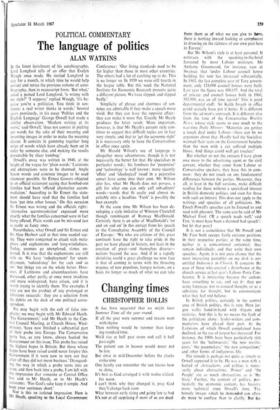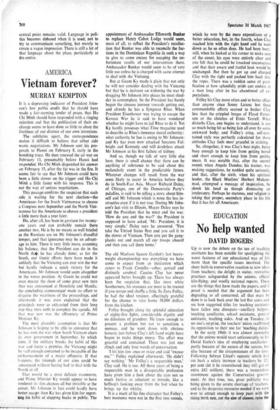The language of politics
POLITICAL COMMENTARY ALAN WATKINS
In the latest instalment of his autobiography, Lord Longford tells of an offer that Evelyn Waugh once made. He invited Longford to stay for a month, in which time he would help correct and revise the previous volume of auto- biography, then in manuscript form. 'But what,' asked a pained Lord Longford, 'is wrong with my style?' I suppose,' replied Waugh, 'it's be- cause you're a politician. You think in sen-
tences; a real writer thinks in words.' Several years previously, in his essay 'Politics and the
English Language' George Orwell had made a
similar observation. 'Modern writing at its worst,' said Orwell, 'does not consist in picking out words for the sake of their meaning and inventing images in order to make the meaning clearer. It consists in gumming together long strips of words which have already been set in order by someone else, and making the results presentable by sheer humbug.'
Orwell's essay was written in 1946, at the height of the vogue for 'plain words.' Latinisms and abstractions were to be shunned; Anglo Saxon words and concrete images to be used whenever possible. Sir Ernest Gowers objected to an official statement saying that bombed-out families had been 'offered alternative accom- modation.' According to Sir Ernest the state-
ment should have read that the families had been 'put into other houses.' On this occasion Sir Ernest was wrong and the officials right: 'alternative accommodation' expressed more exactly what the families concerned were in fact being offered. Plain words can be mis-used just as easily as fancy ones.
Nevertheless, what Orwell and Sir Ernest and Sir Alan Herbert said at that time needed say-
ing. They were concerned to attack stale meta- phors and euphemisms and long-windedness. Today, avenues go unexplored, stones un- turned. It is true that the euphemisms are still
with us. We have 'redeployment' for unem- ployment, 'redundancy' for the sack and so on: but things are on the whole better. How- ever, if Latinisms and circumlocutions have decreased, other perils, at once more insidious and more widespread, have arisen, and it is
worth trying to identify them. The examples I take are not the product of any prolonged or
laborious research: they are a selection from the debris on the desk of one political corre- spondent.
We may begin with the cult of false sim- plicity; we may begin with Mr Edward Heath.
The Government,' said Mr Heath to the Cen- tral Council Meeting, at Church House, West-
minster, 'have now finished a substantial part
of their probe into Europe. The Conservative party has, as you know, always backed the Government on this issue. This probe has raised the highest hopes in Britain. But those whose hopes have been raised could never forgive this Government if it were now to turn out that after all they did not mean business.' Disregard- ing the way in which a probe turns into an issue, and then back into a probe, I am left with the impression that someone at Central Office has said to Mr Heath, or to Mr Heath's assistants: 'For God's sake keep it simple. And keep your sentences short.'
Nor is this an isolated impression. Here is Mr Heath, speaking to the Local Government Conference: 'Our living standards used to be far higher than those in most other countries. The others had a lot of catching up to do. This is no longer so. In 1959 we were still fourth in the league table. But this week the National Institute for Economic Research presents quite a different picture. We have slipped, and slipped badly.'
Simplicity of phrase and shortness of sen- tence are admirable if they make a speech more vivid. But they can have the opposite effect: they can make it more flat. Usually Mr Heath produces the latter result. More important, however, is that Mr Heath's current style con- trives to suggest that difficult topics are in fact very simple, and that to 'get the economy right' it is necesssary only to have the Conservatives in office once again.
Mr Harold Wilson's use of language is altogether more adventurous, though it is not necessarily the better for that. He specialises in particular words: his fondness for 'purposive' and 'technology' is well known : more recently 'effete' and 'ideological' (used in a pejorative sense) have come into their own. Mr Wilson also has, what Mr Heath does not possess, a gift for what one can only call sub-editors' words—words that fit easily and almost in- evitably into a headline. 'Funk' is possibly the best example.
At the same time Mr Wilson has been de- veloping a style imitative of Winston Churchill though reminiscent of Ramsay MacDonald. Certainly there is an echo of MacDonald's 'on and on and on' in this extract from his speech to the Consultative Assembly of the Council of Europe: 'We who are citizens of this great continent have the right to take pride in the part we have played in history, not least in the creation of great—and themselves diverse— nations beyond the seas. And if in a rapidly shrinking world a great challenge we now face is that of coming to terms with the thrusting urgency of new populous, hungry nations, on a basis no longer so much of what we can take
from them as of what we can give to Stern, there is nothing inward looking or complacent in drawing on the richness of our own past here in Europe.'
But Mr Wilson's style is at least personal. It contrasts with the speaking-to-the-brief
favoured by most Labour ministers. Mr Anthony Greenwood, for instance, says at Swansea that 'under Labour council house
building for rent has increased substantially. In 1963, the last complete year of Tory govern- ment, only 124,008 council houses were built. Last year the figure was 180,137. And the total of private and council houses built in 1966, 385,509, was an all time record.' This is good departmental stuff: Sir Keith Joseph in office could scarcely have put it better. It is different from the ad-man's approach. It is different also from the tone of the Conservative Weekly News, whose style seems to owe much to the war-time Daily Mirror: 'Motorists are getting a tough deal under Labour—there can be no areument about that. Hardly had the Socialists warmed their seats on the Government benches than the man with a car suffered multiple blows. And things could well get tougher.'
But whether or not the extracts I have given owe more to the advertising agent or the civil servant, whether they come from Labour or Conservative speakers, they have this in com- mon : they do not touch on any fundamental differences between the parties. Moreover, they all, at least in the full versions, make difficult reading for those without a specialised interest in British domestic politics, and even for those with such an interest. This does not apply to the writings and speeches of all politicians. Mr.
Enoch Powell's speeches can be listened to and read with pleasure. The same can be said of Mr Michael Foot. ('If a speech reads well,' said Fox, 'it must have been a damned bad speech': but let that pass.) It is not a coincidence that Mr Powell and Mr Foot both occupy fairly extreme positions in their respective parties; at the same time, neither is a conventional extremist; they remain individuals; and they write their own speeches. Again, it is not pure chance that the most interesting pamphlet on my desk is one entitled Indecency in Church. It concerns the case of those who created a disturbance at the
church service at last year's Labour Party Con- ference. It is interesting because the authors have something to say, and say it: they are using language, not to conceal thought, or as a substitute for thought, but to communicate what they feel and believe.
In British politics, certainly in the central area of British politics, this is rare. Here jar- gon walks hand-in-hand with slogans and statistics. And this is by no means the fault of the politicians alone: leader-writers and com- mentators have played their part. As the Latinisms of which Orwell complained have declined, so the use of jargon has increased. For instance, the 1960s have been particularly rich years for the 'technocrats,' the new merito- crats,"the pacemakers,' the new competitors,' and other forms of indigenous life.
The remedy is perhaps not quite as simple as Orwell supposed it to be. He was a man with a hatred of abstractions, and politics is neces- sarily about abstractions. 'Power' and 'the People' are as much abstractions as is 'the State.' Further, the content of politics, par- ticularly the economic content, has become more technical since Orwell's time. The homely images which he demanded can often do more to confuse than to clarify. But his
central point remains valid. Language in poli- tics becomes debased when it is used, not to try to communicate something, but merely to create a vague impression. There is still a lot of that language about the place, particularly at the centre.































 Previous page
Previous page